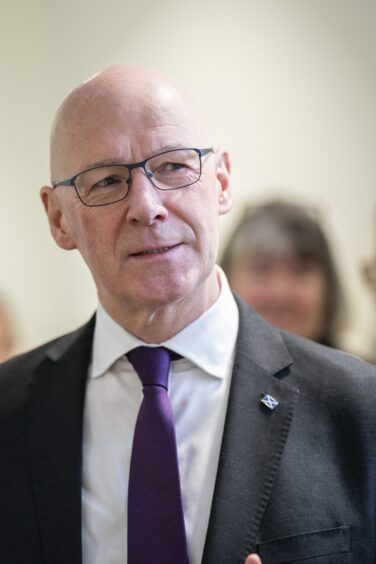The financial crisis at Dundee University is just the latest example of Scotland’s reliance on immigration.
It’s an issue that has been discussed in the UK for decades — but politicians are often too frightened to have an honest conversation with voters.
Rather than lead and explain, they quickly abandon good government for the sake of a soundbite.
But the financial crisis at the University of Dundee is just the latest example of our country’s reliance on immigration.
Scotland’s population stands at record levels but the speed at which it is growing has slowed down.
Aging population leave is reliant on immigration
It’s also aging as more people enter older age groups than ever before – with a 50% increase in over 60s predicted by 2033.
Like it or not – it leaves us extraordinarily reliant on immigration.
Political pressure has seen successive governments put a focus on bringing the overall migration numbers down.
They fall into that political trap of just looking at the raw numbers. The same mistake is made when talking about education or health funding.
Outcomes, not totals, matter
That assumption that totals, rather than outcomes achieved, is what actually matters.
We know this conclusion is false. Despite record levels of health service investment, outputs are down and fewer people are being treated.
So it’s wrong to look at immigration through the lens of a balance sheet. Instead, we need an honest assessment of our country’s needs.
UK Government rejection of Scottish student visa
And Scotland has unique challenges to the rest of the UK. Our NHS, for example, depends on medics, nurses, porters and cleaners from across the world.
All the more confusing then that the UK Government dismissed out of hand what seemed like an attempt by First Minister John Swinney to develop a bespoke solution to our need to attract more international students.
An under-recruiting of foreign learners has cost Dundee University £12.5 million. The reasons are complex, but the senior leaders at the institution cite the UK Government’s immigration and visa policies as a major factor.
The UK has become a less attractive place to move to. Those who do face a complicated bureaucracy, with strict rules on how much they should earn and what type of course they should study.
And many of these policies seem to be designed around the needs of London and southeastern England — a world away from Dundee.
My colleague Adele Merson had a chance to quiz the UK’s migration minister on the problem.
She asked whether the government agreed its policy had made Scotland poorer, and why they had rejected a proposed Scottish student visa.
The minister, it seems, was either poorly briefed or completely unwilling to set out and own a clear position.
Rather than an explanation of what the government would actually do, she stuck rigidly to talking points about Westminster and Holyrood working together on an immigration strategy that worked for all of the UK.
On the surface it seems an admirable goal. In reality it is meaningless.
Meanwhile the SNP government has put forward a specific plan they say will help. Of course, the merits of the suggestion are up for debate.
But within hours, before the detail could even be properly understood, the UK Government had ruled it out.
If they had examined it, they’d have noted it’s not even a novel idea and wouldn’t require any new powers for Holyrood.
John Swinney proposal is not new
In 2004, the then Labour first minister, Jack McConnell, launched the Fresh Talent scheme. It allowed overseas graduates to remain in Scotland and work for two years after their studies had ended.
The UK Government, beyond lofty talk, has yet to suggest how it will actually deliver an immigration strategy that meets the varying and unique needs of different parts of the UK.
It’s no wonder then that there is growing disquiet among the Labour ranks in Scotland about the performance of Sir Keir Starmer.
Scottish leader Anas Sarwar is attempting to halt a dramatic slump in the polls – all of which suggest voters are getting back behind the SNP even after 17 years in government.
Senior insiders admit the Starmer government has failed to tell a story about its mission, damaging the Scottish party’s hopes in 2026.
Rather than delivering the much promised “change”, the newly elected Labour MPs have had to line up behind a series of unpopular policies that have done little to persuade Scots to back the party over the SNP.
One fed-up Labour insider told me: “Its been pretty dreadful and no one should be surprised we’re trailing in the polls.”
Immigration is a thorny issue. It’s a discussion that will require truths many people won’t want to hear or accept.
But the Dundee University funding crisis shows it’s a discussion that needs to be had honestly. We elect leaders not mouthpieces. It’s time they did some leading.













Conversation